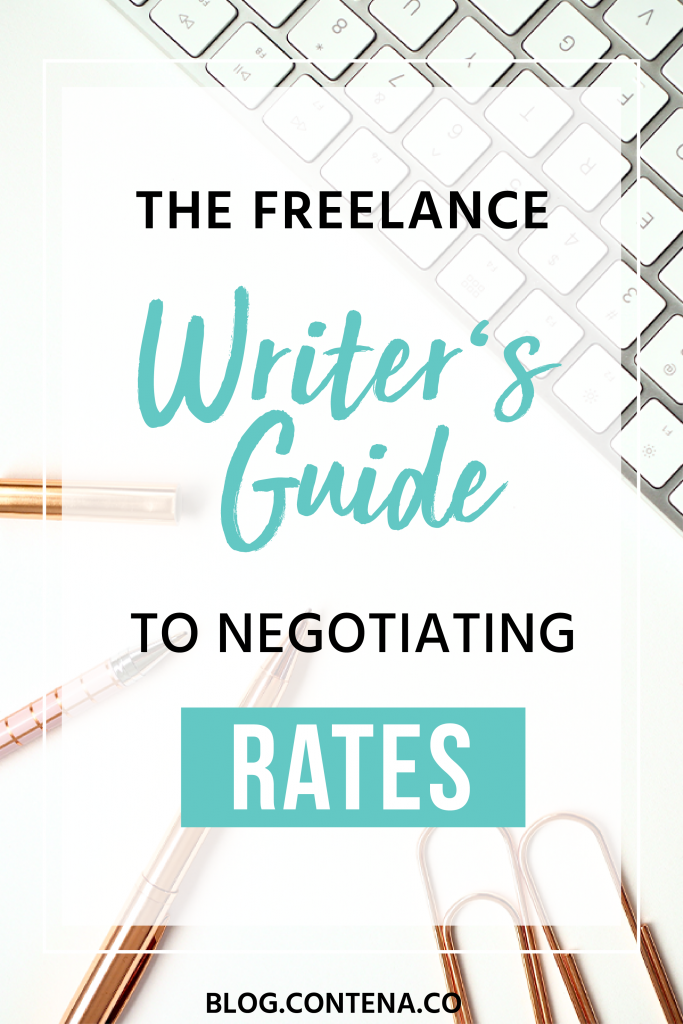‘Tis the season. In December, clients review their budgets and many freelancers try to negotiate higher pay rates for their articles.
Freelancers may also find more new clients than usual this time of year. Companies are writing their budgets, determining their content writing needs, and may decide to outsource the work.
If you’ve been stuck at the same rate for years, it’s time to ask for more money – from existing clients and new clients, alike.
End of year is a great time to renegotiate rates, but that’s not the only time of year this can be done.
Employees sometimes recognize cost of living increases annually. As freelancers, the burden is on us to ask for more money and to negotiate for what we deserve.
But how?
Even seasoned freelancers say raising their rates or asking for more money is one of the biggest challenges to their business.
Years ago (and I’m not proud of this!) I stopped working for a client because the rates were too low, but I was afraid to ask for more. It was easier to just stop asking for assignments. I didn’t ghost him or miss an assignment. But he got busy and shifted his focus away from content marketing, and I didn’t pursue more work from him.
Three years later we reconnected. I sent him my new rate sheet, with pricing triple what I was charging before. He assigned me work without hesitation.
I wonder what would have happened if I simply asked for more money before?
There’s no need to go to that extreme to avoid asking your freelance clients for a raise.
In fact, I will show you exactly how to do it and how to figure out how much money you should ask for.
When you’re quoting new projects, you can use a formula to determine how much to ask for.
What Is a Good Pay Rate for Freelancers?
Before you embark upon raising your rates, it’s important to decide how much you want to earn.
Employees talk about wages in terms of “hourly pay” or “annual salary.”
But when freelancers quote prices, they usually quote “per project,” or “per word.”
Some freelancers may consider $1 /word as the “holy grail” of freelance pay. .50 cents is also a good rate. But many content agencies pay closer to .05 cents or .10 cents per word… and some pay even less.
But none of these numbers provides a good idea of how much money you are making in the corporate world, where people think in terms of hourly wages or annual salaries.
Your definition of a “good rate” may vary based on your living expenses, your level of experience, and even where you live.
It can also be driven by how much you’ve made at prior, full-time jobs, or simply a goal you set for yourself.
For simplicity’s sake, and because tax situations vary widely, we are going to determine a sample preferred hourly rate before taxesin our example.
It is not unusual for top-tier content writers to earn $50 to $100/hour before taxes and even more. Some freelance writing job boards accept $15/hour as the lowest acceptable rate, even for freelancers just starting out.
The Secret Formula to Calculating Freelance Writing Rates
Once you know how much you want to make hourly, it’s easy to set your freelance writing rate.
Think about how much time the article will take you. If you’ve written more than a few articles, you should know approximately how many words you can write per hour.
Remember to include other tasks related to completing the piece: Research, pitching (if you had to pitch the idea first), running the article through Grammarly, and uploading to the client’s content management system (if required).
If it’s your first time writing for a client, include some extra time for re-writes – perhaps 30 minutes to an hour depending on the length of the article.
Here’s an example:
I have a regular client where I pitch three ideas per month. The client chooses one of the ideas for me to write.
I spend a half hour writing the pitches. The article takes me an hour to write, and another half hour to run through Grammarly, find a suitable image, and upload my final version to WordPress.
I’ve been working with the client for years and they rarely request rewrites, so that no longer factors in.
I charge $200 for the article, which means I am making $100 / hour.
30 min. + 30 min. + 60 min. = 120 min. or 2 hours
2 / $200 = $100
At the beginning of 2018, I set $100/hour as my minimum rate.
I sometimes take work that pays less for various reasons. Maybe I enjoy the subject matter, really like working with the client, or cash is tight and I need the money for a special occasion or unexpected expense.
But $100/hour is my starting point.
Once you know how long an assignment will take, you can figure out your hourly rate, and then convert it into a per-project or per-word rate to quote to clients.
Never Quote Your Hourly Rate
This is important: Always convert your hourly rate into a per-word or per-project rate for your client.
Many of our clients have salaried jobs. They are most likely not making $100 an hour.
Almost any client will balk at this rate.
But salaried employees also get paid-time-off, health benefits, and taxes taken out, as well as having office equipment and probably even an IT staff at their service.
Freelancers buy their own computers and peripherals. If something breaks, it’s on us to troubleshoot and fix it or hire someone to help.
If we get sick, we can’t work and don’t get paid.
In short: The $100/hour rate of a freelancer is not equal to the same amount for a salaried or hourly employee.
But clients may hear that number and think, “I wish I made that much!”
You know an article will take you two hours to put together, but you quote your price as a flat rate per 1,000 words.
Earning $200 for 1,000 words works out to a respectable .20 cents per word, a rate many clients will deem reasonable.
Now you can also see why it is so important to learn how to write quickly to increase your earnings as a freelancer.

How to Refine Your Rate Based on What A Client Will Accept
Setting rates would be easy if all you had to do was calculate a flat rate based on the formula above.
But you also have to decide on a rate the client will accept.
Based on market research you’ve done and conversations with other freelancers, are clients like yours, in general, willing to pay that much?
If not, you’ll have to decide if it’s worth lowering your rates (or perhaps figuring out a way to get the work done faster).
A lot of writers will tell you not to cut your rates. But if you bid too high, some clients will just not reply. You’ve lost the job with no chance to negotiate.
By doing your research and quoting a reasonable price that is in line with what others charge for similar work, you put yourself in the running. Then you can decide if you want to work at that rate.
Let’s face it, sometimes any money is better than no money.
There also may be opportunities to start low and ask for more money in the future.
On the other hand, does the amount seem too low based on what you know about the market? Maybe you can increase the rate – especially if it is a large or well-known company.
How to Ask for What You Deserve
Once you are certain about your rate, now comes the easy part. (Trust me, it’s easy.)
Simply send your client your rates.
Do not quote a range. The client will only see the lowest number and you will lose out.
And don’t say, “These rates are negotiable.”
If you decided to offer a discount for any reason, mention that.
Here’s an example of an email I wrote to a regular client quoting a new project:
Hi, [first name],
How are you? It was good speaking today! I can write [the landing pages] for $80 per page (a 20% discount from other pages) and can have them finished within a week from the project start date.
Each page will include 300 – 500 words of optimized copy about [services we discussed].
Let me know – I’m excited to get started on this.
Thanks for everything!
[signature]
It was as simple as that. This letter is informal because we have been working together for decades.
But notice what I didn’t do:
I didn’t share how long it would take me to write each page.
I didn’t make excuses about why I couldn’t charge less.
I did not say the rates were negotiable or ask if it was okay.
I did offer a small discount after I calculated my true hourly rate using the formula above.
The client specifically asked for a bulk discount. He historically pays quickly, which made this project attractive to me even at a discounted rate.
Tips for Raising Your Rates for Existing Clients
What if you’ve been working with a client for years and want to negotiate a raise for the same work you’ve been doing?
I never mention that I’m “raising” my rates.
For an end-of-year negotiating letter, I might write:
Hi, [client],
It’s been a joy working with you in 2018. As the new year rolls around, we are all evaluating our budgets.
Here are my new rates for 2019. [List rates].
Here are a few pitches to jump start the new year:
[Include article pitches here, if relevant.]
Thank you for everything.
I may also include reminders of how my content has helped their business grow in the past year, any new skills I’ve learned or certifications I’ve earned, or additional services I’m willing to provide.
Keep it short and sweet and sell yourself by sharing the value your writing provides to the company.
The client doesn’t care that the cost-of-living went up in your area, or you have additional expenses, or that you’re saving for vacation.
How you spend the money is up to you.
The client only cares about the value you’ll deliver at your new rates.
Negotiating Rates: Practice Makes Perfect
Most writers will say negotiating is the most difficult part of their job. Discussions about rates often spark heated debates in writers’ groups.
But once you know how to convert project rates into hourly rates effectively, you can figure out how much to ask for Once you start asking for more money, it gets easier with every email you send.
As you begin talking with veteran writers, you’ll discover the sky’s the limit on your earnings as a freelancer.










